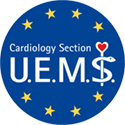Introduction
1.1 The European Examination in Core Cardiology (EECC) is intended to be a high quality examination but on occasion candidates may be dissatisfied with the way in which something has been done. Any complaints arising from this will be handled in a clear, fair and consistent way.
1.2 These Procedures apply to all candidates, or prospective candidates, who consider that they have grounds for complaint regarding the provision of the EECC. Although the complaint may relate to actions undertaken by the exam provider or the exam developers (European Society of Cardiology and UEMS-Cardiac Section) where possible the complaint will be dealt with by the candidate’s registering national society (NCS) in line with these Procedures. Each NCS will have an examination board and the chairman of that board (NCS Exam Board Chair) will be the NCS representative on the EECC Board. These procedures may, if necessary and deemed appropriate by the EECC Board, be used by the EECC Board itself to consider complaints by any other party.
1.3 Complaints will not be considered if they are submitted anonymously or on behalf of another party, without that party’s explicit consent in writing.
1.4 Candidates should note that by virtue of entering to sit an examination they are deemed to have understood and agreed to respect and abide by all relevant regulations, including these Complaint Procedures.
1.5 Any dispute as to the interpretation of these Procedures shall be referred to the EECC Board Chair, whose decision in the matter shall be final.
Definitions
2.1 A ‘complaint’ is defined as an expression of a specific concern about the provision or quality of the EECC, including issues such as staff conduct.
2.2 Any request for a review of a decision made by or on behalf of the EECC Board about the performance in an examination of a candidate or group of candidates is defined as an ‘appeal’ and as such will be considered under the Appeals Regulations (appendix 3).
2.3 It is recognised that on occasion it may be initially unclear whether a case constitutes a complaint or an appeal, hence the NCS Boards and EECC Board reserve the right to reclassify complaints to appeals or vice- versa at any stage in proceedings, in consultation with the person(s) complaining or appealing.
2.4 These procedures are not applicable if the complaint appears to be intended to delay or prevent the consideration of an allegation of academic misconduct.
Procedure
3.1 It is expected that complaints will be raised as quickly as possible and no more than thirty days from the date in which the incident occurred.
3.2 It is a principle of this procedure that an informal and flexible approach to resolution of complaints will be adopted wherever possible. All complaints can be raised informally as they arise with the individual or organisation you are dealing with. The vast majority of complaints can and should be resolved in this way.
3.3 Candidates are assured that they have the opportunity to raise matters of legitimate concern without risk of disadvantage or criticism. Towards this end the importance of confidentiality will be recognised when handling complaints as far as is possible during any investigation. However, it will occasionally be necessary to disclose a complainant’s identity to progress an investigation. Candidates who are not willing for their identity to be disclosed in this way should make this clear in their letter of formal complaint.
3.4 If it is considered that the complaint is vexatious, or malicious; or the complainant has used false information in a complaint, they may be liable for action to be taken under the Misconduct Procedure.
3.5 If your complaint remains unresolved by informal means, you can contact the relevant NCS or EECC Board. All formal complaints must be submitted in writing and state the following: (i) the nature of the complaint, (ii) what has / has not been done to resolve it, (iii) why the complainant is not satisfied with what has / has not been done, and (iv) what the complainant would like to be done to resolve the matter to his/her satisfaction. Complainants must make clear in the letter that it is a formal complaint they are submitting, and make clear to all other NCS or EEGC Board staff they may continue to have contact with that they have submitted a formal complaint.
3.6 All complaints will be acknowledged. Wherever possible a full response will be made within twenty working days of receipt, unless extenuating circumstances exist in which case the complainant shall be informed of this and notified of the revised deadline for the response. Full reasons shall be given for the decision reached.
Appeals about the outcome of complaints
4.1 If a complainant is not satisfied with the outcome of their formal complaint they may appeal in writing to the Chair of the NCS exam board or EECC Board.
4.2 All appeals about complaints will be acknowledged and wherever possible a full response will be made within twenty working days. If extenuating circumstances exist which affect this timeframe the complainant shall be informed and notified of the revised deadline for the response.
4.3 The decision of the Chair of the NCS exam board or EECC Board is final, and candidates will be notified of this and the complaint closed.
Example flow chart
5.1 Candidate wishes to submit an Appeal or Formal Complaint.
5.2 Candidate writes to NCS with details within 30 days.
5.3 NCS acknowledge receipt within 5 days.
5.4 NCS considers and response decided within 20 days.
5.5 Candidate wishes to appeal NCS decision within 10 days.
5.6 NCS acknowledges within 5 days.
5.7 EECC Board reconsiders and responds or convenes a Hearing within 20 days.
